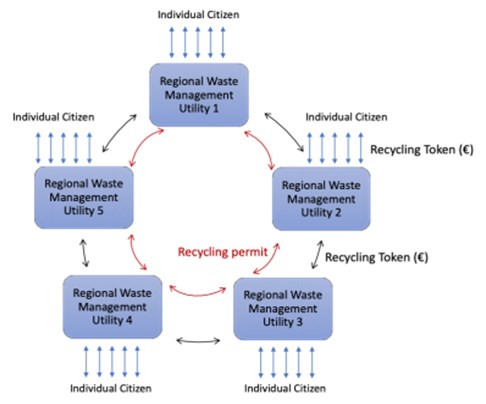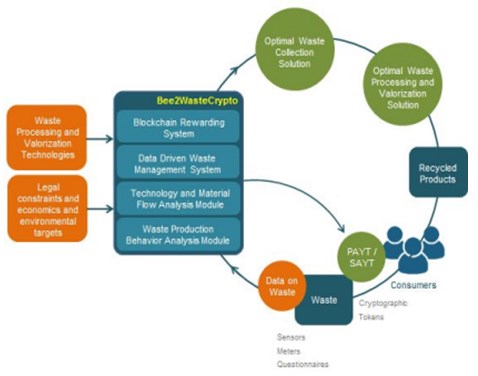Developing sustainable waste management systems, aiming at very demanding reuse/recycling targets and contribute to promote a circular economy, constitutes a great social problem. The individual behavior and the need to improve the citizen attitude to waste production and waste separation, the development of economic incentives that flow across the full chain of waste management, the performance monitoring of waste collection and management systems with credible mechanisms and the transformation of waste into useful raw materials, results in an opportunity to generate qualified jobs, and promoting abetter environment.
This requires a new approach to waste management, and this Consortium offers to consider waste in the same way as energy has been redefined as a resource to be managed in the past 20 years and to make use of new blockchain based technologies to provide incentives for the key stakeholders and the citizens to change their behavior, making sure that this is based on accurate data. This approach is supported by developing an innovative IT tool “Bee2WasteCrypto” that contributes to empower Regional Waste Management Utilities (RWMU), as the facilitators of decentralized and customized solutions and promoters of new citizen behavior in terms of waste generation and handling.
“Bee2WasteCrypto” facilitates the quantification and characterization of waste production at the source with high resolution scales, to facilitate Pay As You Throw (PAYT) schemes, together with the use of blockchain technologies to produce credible information that will support the proliferation of “recycling rate credits” based on the performance of each RWMU in relation to national recycling rate targets for each material stream (an analogue of carbon credits in the energy sector) and the subsequent purchase of “recycling rate credits”, from the low to the high performers”, enabling nations to have a scheme to encourage RWMUs to optimize their management .
As schematically shown in Figure 1, this approach could be implemented via “Tokens” that promote economic incentives according to each country/region policy. In addition, the individual citizen (via the municipal waste producer) would also be compensated for behavior aligned with reducing waste production or in separating waste. Achieving this requires use of detailed accounting systems (like blockchain) and secure payments, for which the Consortium will explore use of crypto currencies. This will provide a unique tool to promote the “revolution” that the waste management sector is calling for.





